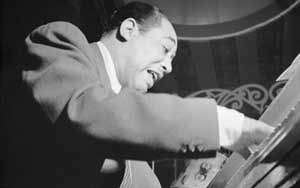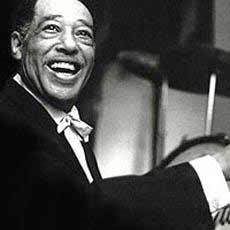|
 Duke Ellington played piano, but his real instrument was the orchestra |
RAY FREEMAN: And I'm Ray Freeman with the VOA Special English program PEOPLE IN AMERICA. Every week we tell about a person who was important in the history of the United States. Today, we finish our report about the great jazz musician Duke Ellington.
(MUSIC)
RICHARD RAEL: That song is "Take the 'A' Train." It is like a musical sign that says, "You are listening to Duke Ellington and his orchestra." Music fans around the world know the song is linked closely to Duke Ellington. Yet they may not know that he did not write it.
"Take the 'A' Train" was written by a close friend and orchestra member, Billy Strayhorn. Billy and Duke had a very close working relationship for almost 30 years. Sometimes, it was difficult to tell which man had written a new song for the orchestra. Members of the group often argued about who had written it ... Duke or Billy Strayhorn.
|
 "Take the 'A' Train," written by Billy Strayhorn, was Duke Ellington's most famous song |
Listen to this Ellington song, played by Russell Procope. Procope played the clarinet in the Ellington orchestra for many years. In this song, Procope was able to play his part a different way each time. Ellington let individual players create their own parts. This means it is almost impossible today to reproduce the sound of Duke Ellington's orchestra.
The song is called, "Four-Thirty Blues."
(MUSIC)
RICHARD RAEL: Duke Ellington tried many new and different ways to play music. For example, he put different instruments together in groups that no one had tried before. He also was the first song writer to use a human voice as an instrument.
He wrote music for a singer but no words. The song is called "Creole Love Call." The singer here is Adelaide Hall.
(MUSIC)
RAY FREEMAN: Duke Ellington was one of the most popular musicians in the 20th century. Yet, music experts and critics say he was much more important as a song writer and orchestra leader than as a piano player. Billy Strayhorn once said, "Duke plays piano. But his real instrument is the orchestra."
The orchestra was Duke Ellington's first love. In later years, when large orchestras were not popular, Duke often paid his musicians with his own money to keep the group together. To him, the orchestra was everything.
RICHARD RAEL: Duke Ellington always was looking for ways to make his orchestra sound better. Like many song writers, he often took old songs, changed them, and made them new again.
Last week, we played a song called "Concerto for Cootie." In later years, a singer named Al Hibbler joined the Ellington orchestra. Duke added words to the song. Then he changed its name to "Do Nothing 'Till You Hear From Me." Both songs were major hits for the orchestra. Listen as Al Hibbler sings, "Do Nothing 'Till You Hear From Me."
(MUSIC)
RAY FREEMAN: Duke Ellington and his orchestra played around the world before millions of people. More than 800 musicians played with the Ellington orchestra at one time or another. After doctors told Duke that he had lung cancer, he continued to perform. One of his last concerts was at Westminster Abbey in London. His orchestra performed religious music.
Duke Ellington was honored by people around the world. Former president Richard Nixon give him the presidential medal of freedom -- America's highest civilian honor. Leaders from around the world wrote him letters to thank him for his music.
Duke Ellington died on May 24th, 1974.
RICHARD RAEL: If you really want to know the real Duke Ellington, you must listen to his music. The music he left the world is truly a great gift.
We leave you with Duke Ellington and his orchestra playing like they always did. This recording was made in a room full of people dancing to his music. The place is McElroy's ballroom in the city of Portland, Oregon.
It is near the end of the evening. You can hear the crowd in the big room. The people have been dancing and do not want to stop.
Duke Ellington, sitting at the piano, starts another song. It is his signal to the orchestra. Once again, the Duke Ellington orchestra begins to play "Things Ain't What They Used to Be."
(MUSIC)
RAY FREEMAN: This Special English program was written, produced and directed by Paul Thompson. I'm Ray Freeman.
RICHARD RAEL: And I'm Richard Rael. Join us again next week at this time for another PEOPLE IN AMERICA program on the Voice of America.
Duke Ellington, 1899-1974: from a young painter to musical royalty
Good bye to a nostalgic musical artifact
Everette Harp revives traditional jazz sound on 'First Love'
Ted Nash plays jazz inspired by art
(来源:VOA 编辑:陈丹妮)
